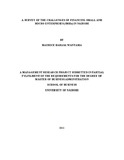| dc.description.abstract | In the past five years there has been efforts made by SMEs in ensuring that they remain relevant and competitive. To remain competitive in the market the latest technology has to be applied, staffbe equipped with the relevant skills, modem tools for projects monitoring and evaluation used. The SMEs need financial resources to facilitate all these operations in the organisation. Most SMEs do not have sufficient funds of their own to finance their projects hence have to source from outside. The process of accessing these funds has not been easy, there have been numerous hurdles that have to be overcome before funds are secured. The purpose of this research was to identify the main challenges encountered by SMEs in the course of raising finances for their operations with the view of recommending ways of dealing with these challenges.
Data was collected via questionnaires with forty (40) SMEs based in Nairobi. All the SMEs were targeted hence no sampling was applied. Data was collected and analysed using SPPS version 17. The findings were that SMEs face several challenges in the course of seeking funds to finance their projects. Most of these challenges are conditions that are within the control of SMEs. The SMEs can overcome these challenges by adopting specific strategies in their operations. It was also noted that a few challenges are from external forces that SMEs have little or no influence.
It was concluded that the SMEs need to carry out a SWOT(Strength, Weaknesses, Opportunities and Threat) analysis and change their operations to remain effective and efficient, to influence the external parties by ensuring constant availability of information that may influence third parties perception for better. Specific main challenges identified include; lack of sufficient past financial records, lack of modem accounting system, lack of proper tools of monitoring and evaluating the projects, negative attitude toward SMEs by commercial banks, bias evaluation and rating of SMEs by potential lenders, lack of well trained staff, misclassification of SMEs as NGOs by some partners, lack of collateral, inability to service loans and lack of tools to evaluate projects that need to be implemented. | en_US |

